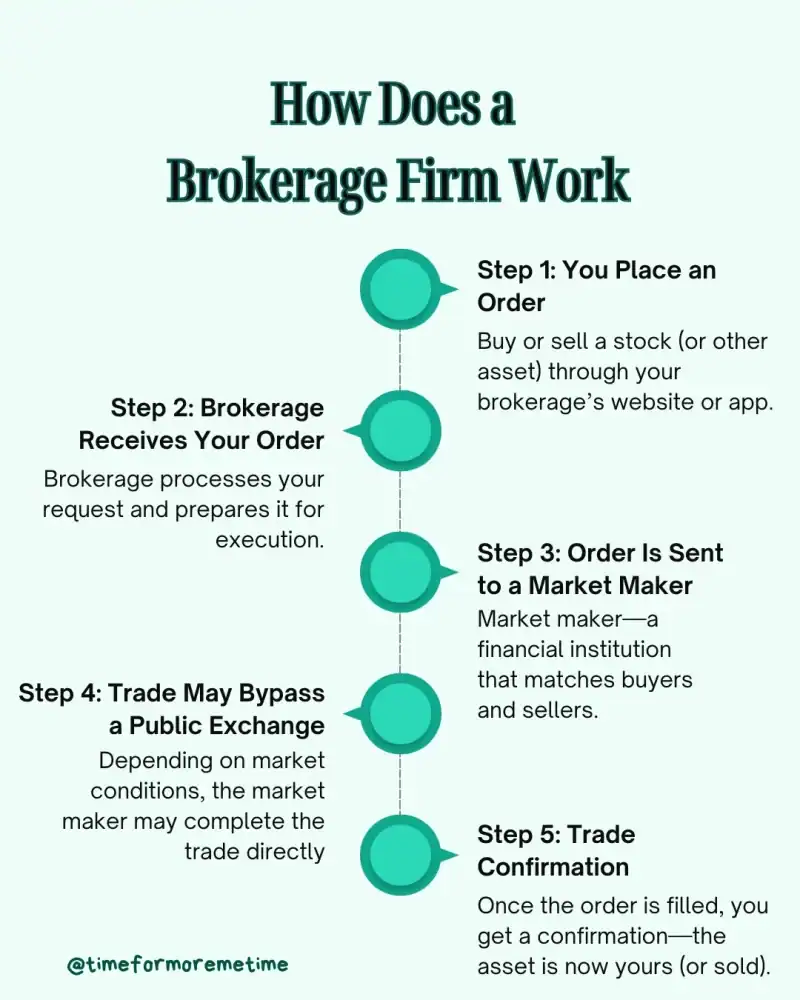Are you thinking about investing but not sure where to start? Many beginners begin by choosing a brokerage firm. In this post, we’ll explain what brokerage firms are and how they work to help you get started. Let’s get started!
What Is A Brokerage Firm

Brokerage firms give you access to financial markets, where assets and money are traded, and manage your investment orders—like buying and selling stocks or other assets.
For example, when you want to buy a stock, the brokerage firm typically routes your order to a market maker—a financial institution that facilitates buying and selling stocks. Depending on market conditions, market makers may complete your trade directly without going through a public exchange.
Brokerage firms offer secure, regulated accounts that keep your money and investments separate from their own assets, often using a licensed custodian. This ensures that your funds are only used for your orders.
By the way, brokerage accounts are typically protected by the Securities Investor Protection Corporation (SIPC). This insurance covers up to $500,000 in total assets, including up to $250,000 in cash, if the brokerage fails or goes under. However, it does not protect you from losses due to market fluctuations or bad investments.
Additionally, brokerage firms keep clients informed about their investments. Through their websites and apps, you can check your balance, monitor investment performance, and manage your profits.
To generate revenue, brokerage firms usually charge trading fees or commissions. However, many now offer commission-free trading, especially for stocks, and may earn money through other methods like payment for order flow, margin interest, or account fees.
You can invest in various financial instruments through brokerage firms, including:
- Stocks: Shares of a company that may pay dividends, which are a portion of the company’s profits.
- Bonds: Loans to companies or governments that pay you interest over time and return the money at maturity or the time set by the borrower to pay everything in full.
- Cryptocurrencies: Digital currencies not tied to any country. Only a few brokerages allow crypto trading, and profits often depend on frequent or high-risk trading, which may not suit beginners.
These are just some common investment options available through brokerage firms, and some may specialize in specific types of investments.
What Are The Types Of Brokerage Firms
Brokerage firms vary in the level of support, costs, and control they offer. Choosing the right one depends on how much assistance you want and how involved you wish to be with your investments. Here are the common types of brokerage firms:
- Robo-Advisors: These automated platforms manage your investments for you. After answering a few questions about your financial goals, the system selects and manages your investments over time. This option is ideal for those who prefer a hands-off approach.
- Discount Brokerages: These firms focus on low costs and typically offer fewer tools and features than full-service brokerages. You can execute your own trades, but you won’t receive personalized advice. This option is great for those looking to save on fees.
- Full-service Brokerages: These firms provide comprehensive support with real advisors who assist you in planning for retirement, managing investments, and developing long-term strategies. While this level of service comes with higher fees, it is beneficial if you want expert guidance.
Each type of brokerage gives you access to the same markets but in different ways. Whether you want full control, automation, or professional advice, there is a brokerage that suits your needs.
What Can You Do In Brokerage Firms

Brokerage firms offer more than just buying and selling stocks; they provide various tools and services to help you manage and grow your money. Here are the main things you can do:
- Track and Manage Your Portfolio: Use built-in tools to monitor your investments, check balances, and review your performance over time.
- Learn About Investing: Access free educational content like articles, videos, and simulators to strengthen your knowledge and confidence.
- Get Help or Advice: Depending on your brokerage type, you can receive robo-advisor automation, expert guidance, or self-directed tools and research.
They offer the tools and support you need to start and grow as an investor, whether you’re managing your own investments, learning the basics, or seeking expert guidance.
How Can You Start Investing In Brokerage Firms
To start investing, first choose a brokerage firm that meets your needs—whether you prefer to manage everything yourself, want automated help, or need a financial advisor. Next, open an account on their website or app by providing basic personal information and selecting your account type.
After setting up your account, link your bank and deposit funds. Many firms allow you to start with a small amount. Then, choose investments based on your goals, often starting with well-known companies or low-risk funds. When you’re ready, place your order through the platform and begin tracking your progress.
Conclusion
Brokerage firms connect you to various financial markets and investment options. They provide a convenient way to start investing and grow your portfolio.
To learn more, check out our other beginner-friendly posts and subscribe for tips on building your financial future. You can also watch our videos on our YouTube channel, follow us on social media, and sign up for our newsletter.
Source
- Photo: Unsplash: Chris Barbalis




